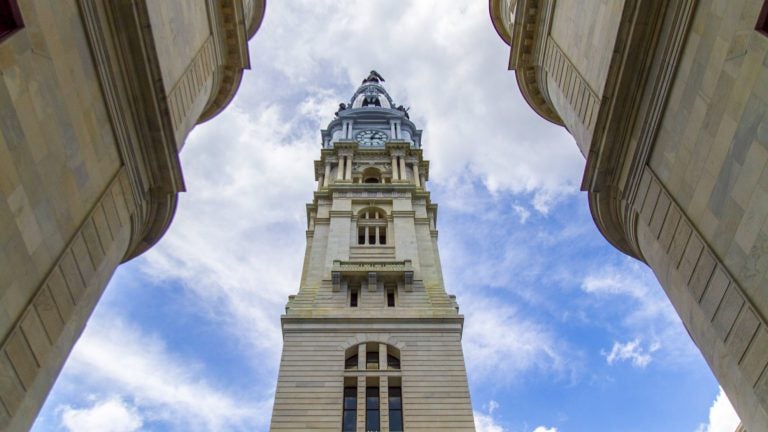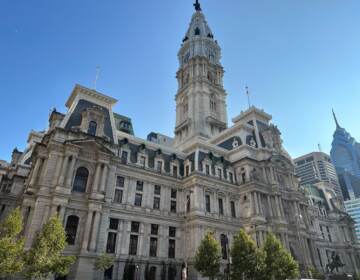City Council preview: Everything Philly leaders will be fighting about this fall
We asked city leaders to tell us their priorities for the fall session. Here’s what Darrell Clarke, Cherelle Parker, Allan Domb and others are planning.

(Miguel Martinez/Billy Penn)
Get your yeas ready: Philadelphia City Council is back in chambers for the fall.
The 17-member legislature is hot off a primary election in May, which was followed by a three-month vacation from their weekly law-making session in City Hall. Most are running unopposed in the November general election, while a few face contested challenges. Does that mean looking for bold legislative victories this season — or taking it easy?
Billy Penn and PlanPhilly made the rounds through chambers on Tuesday to ask Philly’s elected officials in person, though some appear to have skipped the packed hearing on police reform.
What’s in the fall forecast? All eyes are on a bill that would tailor the city’s controversial 10-year property tax abatement, as well as movement on preservation reform. There’s lots of rumbling about curbing gun violence, but no indication city lawmakers can circumvent Harrisburg’s control. And outgoing Councilmember Jannie Blackwell, who was voted out of office after a record eight terms, has “a million things [she’s] trying to do.”
Death to the tax abatement? How about a compromise
Although members have proposed various reforms to Philadelphia’s controversial 10-year property tax abatement for new construction, a hearing hasn’t yet been held on any of them.
Several councilmembers said they expect Council President Darrell Clarke to introduce a new compromise option in the weeks to come. Asked about the legislation, Clarke spokesperson Joe Grace said not to expect any legislation this Thursday, when Council meets for its first meeting of the fall term.
Options being considered include a cap that would limit properties above a certain value from taking advantage, an option the influential Building Industry Association decried over the summer. Other proposals include a phase down that would reduce the abatment’s value over its 10-year window, and a potential geographic restriction on the abatement, similar to a policy experimented with in Bethlehem, Pa.
No one had clarity on what a bill from Clarke would look like, although total elimination is considered highly unlikely. Grace declined to provide details.
“I think ending the abatement is the only fair thing to do,” Councilmember Cindy Bass told PlanPhilly and Billy Penn, “but it looks like folks are leaning towards having some kind of a compromise to reduce it.” Bass proposed tanking the abatement completely last year.
Seeking to legislate away gun violence
The horrific gun violence Philadelphia suffered this summer inspired many local lawmakers to make new moves to address the ongoing epidemic.
But as new efforts mount — three councilmembers say gun violence work is a top priority this fall — questions linger about Council’s ability to enact any meaningful legislation without buy-in from Harrisburg and Washington.
The Republican-controlled legislature in the state capital allows the city very little control over gun regulations. City Council is largely constrained to making unenforceable demands of other institutions like the General Assembly and the courts.
Councilmember Curtis Jones said he plans to introduce a bill that would give city law enforcement the authority to temporarily confiscate firearms from people who are deemed a threat to others. The forced gun removal would begin with a petition from a concerned individual, and end with a judge’s sign-off.
But the bill faces considerable hurdles — both constitutionally and with Harrisburg. A statewide law temporarily removing firearms from individuals with restraining orders managed to clear the capital last year only with great struggle. Jones’ bill goes even further.
“If you’re bullied in a school yard, and all the sudden you say ‘I’m going back to get a gun and I’m going to shoot everybody in here,’ that allows a wider range of considerations to remove firearms from a home,” Jones said, adding that details are not yet final.
Meanwhile, Clarke is joining forces with elected Democrats in Harrisburg to open and concealed-carry firearms from playgrounds and recreation facilities, which saw an alarming number of violent incidents during the warm summer months. Even if passed, questions about enforcement remain an issue.
The city has laws banning weapons from courts and other city-owned facilities with security screening systems. Clarke previously said he does not want “metal detectors at a rec center.”
Clarke’s many development and land use bills
Council President Clarke finished the spring session by introducing a series of sweeping policy proposals that could dramatically change development in Philadelphia.
One would change how the city treats publicly owned land, including elimination of the controversial Vacant Property Review Committee. Philadelphia’s opaque public land process has come under persistent scrutiny, after reports revealed conflicts of interest and lowball deals being cut with the involvement of high ranking city officials.
Clarke’s other efforts include a bill to require projects of a certain size to establish community benefits agreements with local neighborhood groups. Experts have called the gambit legally dubious — and the development industry may balk at the combined affront of such a bill along with substantial changes to the 10-year property tax abatement.
In the spring, the Council President’s frustrations with the city’s zoning regime mounted. A series of bills attempted to restrict duplex construction in a corner of North Philadelphia; ban multi-family variances; and establish a Zoning Code Review Commission to consider more substantial overhauls.
Historic preservation reform on tap
At the end of the spring session, Councilmember Mark Squilla introduced a package of preservation legislation to incentivize the repair and reuse of historic properties.
His proposals included eliminating parking requirements for historic projects, allowing accessory dwelling units in protected buildings, and allowing more flexibility in the underlying zoning of historic properties.
Many preservation advocates would like the city to go further. Mayor Jim Kenney’s Historic Preservation Task Force has presented additional options, and there are several more policies that could be pursued by year’s end.
One is creating a tiered system for historic districts, which often run into neighborhood opposition because their requirements are seen as overly stringent. The potential new policy could create new kinds of districts that would still protect old buildings from demolition while being less restrictive when it comes to, say, what window panes can be used.
There is also talk of creating a historic preservation fund, which developers could pay into like they do with the mixed income housing bonus.
Plastic bag ban and an Airbnb registry
At the end of the last session, Squilla introduced a bill to ban plastic bags…again.
In response, Repulican legislators in Harrisburg promptly banned any municipality in Pennsylvania from enacting such legislation for a year. Earlier this summer, Squilla said he intends to get the legislation passed anyway — with the expectation it could go into effect when the statewide preemption ends.
Squilla also said he’s talking with city officials about additional regulations for short term rentals in the city, like Airbnb. Currently there is no citywide registry and anyone can rent out a room or a house without permitting from the city, as long as they don’t do so for over 90 days a year.
If legislation introduced a registration requirement, Philadelphia authorities would at least know who is providing the service.
Also, bed bugs should still fear Squilla. His extermination legislation is not dead, he said; expect another version to be introduced this year.
Pumping up neighborhood commercial corridors
Councilmember Cherelle Parker is focused on strengthening neighborhood commercial corridors. She is expected to introduce legislation on Thursday that would allocate 30 part-time workers, termed “trainees,” to each of Philadelphia’s 10 City Council districts to help with street cleaning on major avenues and boulevards.
The trainees would work 25 hours a week at $15 an hour, at a total cost of $10 million a year. The program would be administered through the Philadelphia Industrial Development Corporation, placing the program outside the city’s direct purview.
The policy is meant, in part, to provide aid to neighborhoods that lack community development corporations (often established in lower-income areas) or business improvement districts (usually organized when retail is on an upswing).
Parker’s staff said the effort is just the first of a series of bills addressing neighborhood corridors.
Retiree legacy: Get Philly green and do ‘a million things’
Blondell Reynolds Brown is one at least three longtime Councilmembers leaving the chamber at the end of this session. Before exiting, she plans to put to bed regulations around lead paint — which have proven to be a sticking point with landlord groups.
She also divulged plans to call for hearings on the reuse of the Sunoco refinery. Thursday she said she’ll introduce a bill to restrict and eventually eliminate the use of cheap and dirty heating oil. The idea would be to heavily curb its use by 2024 and fully push it out of the city by 2029.
“We have a bill on the use of heavy oils — the more they weigh the more they pollute,” Reynolds Brown told Billy Penn and PlanPhilly. “They don’t have as big a footprint here, but in NYC regulation had a real effect on air quality issues.”
Councilmember Bill Greenlee, who is also retiring, said he plans to hold hearings on how to bring financial services to low income populations. But he offered no concrete legislative proposals.
Councilmember Jannie Blackwell, meanwhile, said she has a long list of bills with which to conclude her decades-long career.
“I got a million things I’m trying to do, a million bills for my area, oh boy,” said Blackwell. “Everything from stop signs to rezoning to honoring people. I’ve got a mishmash of it all.”
She said she’s considering a host of University Cty remapping bills, including one for Garden Court, where neighborhood groups have agitated for zoning changes for years.
Should Philly’s lowest-income populations pay the city’s wage tax?
For years, City Hall has slowly been chipping away at lowering its oft-maligned wage tax on city residents. Right now, at 3.88%, the levy is one of the highest of its kind in the nation, and critics have long said it deters new residents and businesses from crossing the county lines.
It also hit the city’s poorest harder than most, per Councilmember Allan Domb.
In preliminary discussions, the city councilmember and business magnate has pitched an idea a tax kickback for low-income residents similar to the federal Earned Income Tax Credit (EITC). It would work like this: The city would grant reimbursements to residents who make less than $25,000 or less per year.
“Most of our population making that low of an income can barely put food on the table,” Domb said Tuesday. “We shouldn’t be charging them wage tax.”
That’s about 300,000 residents — about one in five people in Philadelphia. The tax kickback could be as much as $1,000 a year.
The grant would mean the city loses millions from its tax rolls each year. Domb said the financial details were still being worked out, but his office is looking at a staggered implementation over several years.
WHYY is your source for fact-based, in-depth journalism and information. As a nonprofit organization, we rely on financial support from readers like you. Please give today.








